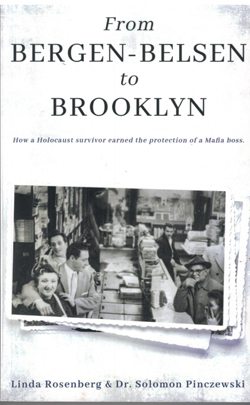From Bergen-Belsen to Brooklyn: How a Holocaust survivor earned the protection of a Mafia boss by Linda Rosenberg and Dr. Solomon Pinczewski; ISBN 9798657-310818; 230 pages plus appendix of family photographs.

 SAN DIEGO — This is a story well told, except that you won’t know any more about the identity of the Mafia boss after reading this book than you do now. Whoever he was, he took a liking to Helen Pinczewski, Solomon’s hardworking mother, after she and her husband David opened a candy store in an Italian section of Brooklyn. He made it his personal mission not to allow any of the tough guys in the neighborhood to harass the couple, for whom he developed a great sympathy after learning they were Holocaust survivors.
SAN DIEGO — This is a story well told, except that you won’t know any more about the identity of the Mafia boss after reading this book than you do now. Whoever he was, he took a liking to Helen Pinczewski, Solomon’s hardworking mother, after she and her husband David opened a candy store in an Italian section of Brooklyn. He made it his personal mission not to allow any of the tough guys in the neighborhood to harass the couple, for whom he developed a great sympathy after learning they were Holocaust survivors.
From my point of view, there were three important takeaways from this biography.
First, a faith that somehow things would turn out for her okay, no matter what, helped teenager Helen Gleitman survive Nazi work camps and Bergen-Belsen, a faith that her grandmother Miriam was watching over her. Of course she couldn’t prove that her grandmother was her guardian angel, but it was enough that she believed it to be true. She survived humiliation, violence, rape, and sickness. And when it was all over, she married David, who had suffered through much of the ordeal with her.
Second, frustration at not knowing the “rules” of the new land, America, to which they immigrated after World War II, and not being particularly articulate in English, caused David occasionally to boil over in rage about his circumstances. Sometimes, when he lashed out, it was at his young son, Solomon. Child abuse is a serious matter; how many emotional scars Solomon still bears from that experience, he and co-author Linda Rosenberg didn’t share with the readers. But this part of the story leaves us thinking: how many other children of immigrants must bear the brunt of their parents’ frustration? How effective are our society’s programs to help immigrants assimilate?
Third, working in the candy store from early in the morning to very late at night left little time for the Pinczewskis to share the life of their young son Solomon, or to participate in his spiritual upbringing. A young Italian man, who was their neighbor, volunteered to take Solomon to the movies, and to Coney Island, and be a big brother to him. He also introduced Solomon to his church, gave him Rosary beads, a copy of the New Testament, and nearly converted the boy from Judaism to Catholicism, all with good intentions. Somehow Solomon conflated the Virgin Mary with his mother’s stories about his great-grandmother Miriam. But when his attraction to Catholicism became apparent to his parents, they realized that even if they had survived Hitler, their family’s Judaism hadn’t — unless they took action. So they enrolled him in a Jewish day school that was two bus rides away, where he was accepted, loved, and soon embraced his Judaism. A child’s religious training, his or her need for guidance, must not be overlooked.
This is a very readable biography — Rosenberg and Pinczewski together are wonderful story tellers — and I think this book will make a favorable impression on its readers. I’d especially recommend it for middle school and high school students.
*
Donald H. Harrison is editor of San Diego Jewish World. He may be contacted via donald.harrison@sdjewishworld.com
I love your review and agree one hundred percent
On your interpretation.
Esther katz
2nd generation survivor
I read the book straight through, cover to cover as soon as it came in the mail through Amazon. Being a Second Generation Survivor, this book really hit home for me. My parents had a Momma/Papa grocery store in the Bario of Downtown Los Ángeles. We lived upstairs from the store and like all immigrant kids, I helped in the “business” and then later cared for my little brother when he came along 8 1/2 years later.
I also could relate to the nightmares my mother had that we comforted her through and the kindness my parents had towards the Hispanic immigrants in the neighborhood.
The survivors were optimistic, patriotic to their new country and so very grateful to have made it in their new home. They believed in educating their children and were loyal, strong and had real family values. Family was everything to them as they had lost so many in the Holocaust.
Sol puts his heart and soul into his book. I recommend it to anyone who wants to know what really happened to the Jews and how they triumphed over all odds. Buy the book. You won’t be sorry.
Zipora Kramer
2nd Generation Holocaust Survivor